All For Literacy
The All for Literacy podcast connects you with established and emerging voices in the national literacy conversation to map a path forward informed by the science of reading. Through monthly podcasts, hosted by Lexia’s Chief Learning Officer Dr Liz Brooke, this series forges connections between literacy research and educators’ knowledge and skills. This is a conversation that will have a real impact on teachers and students, with actionable information and research designed to support our goal of literacy for everyone. All for Literacy brings together researchers, educators, and experts to elevate literacy in America and create real equity in the classroom.
Episodes
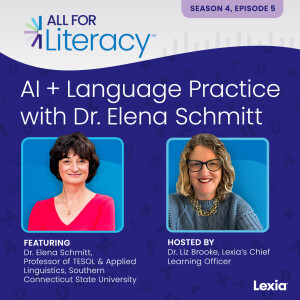
Tuesday May 06, 2025
Tuesday May 06, 2025
Does maintaining their heritage language help students develop literacy skills in English? The research says “yes.”
Dr. Elena Schmitt, professor of applied linguistics and educational researcher, joins All For Literacy host Dr. Liz Brooke for a detailed discussion about how supporting a student’s bilingualism supports the whole child. From maintaining access to key cultural and social interaction to supporting English literacy acquisition, helping students maintain their first language is worth the effort.
Gain an understanding of:
How to apply the research when it comes to supporting English language learning
Actionable ways educators can support bilingual students in their classrooms
Why the advice to “speak English at home” can be detrimental to students
How to create an inclusive environment centered around translanguaging
Tune in to Episode 5 for an inspirational, research-backed discussion about how heritage languages, bilingualism, and translanguaging affect student identity and success.
About Dr. Elena Schmitt
Dr. Elena Schmitt is a professor of applied linguistics and coordinator of the master’s in bilingual education and TESOL program at Southern Connecticut State University. Her research focuses on language contact, first language attrition, classroom interaction, teacher education, and technology-assisted teaching.
Join our community of listeners at All For Literacy today!
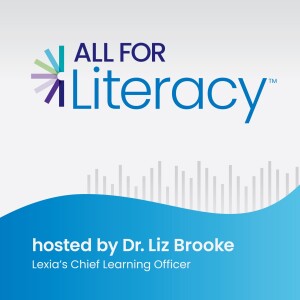
Tuesday Apr 08, 2025
Tuesday Apr 08, 2025
As the crucially important ideas of the science of reading spread, a shift of focus to sustainable implementation will ensure evidence-backed instruction continues to change the literacy landscape. Implementation relies on the mutually beneficial relationship between educators and researchers to work effectively and sustainably.
Started in Part 1 of Season 4, Episode 3, of the All For Literacy podcast, Dr. Liz Brooke, Margaret Goldberg, and Dr. Elsa Cárdenas-Hagan continue their insightful conversation about research access for educators. Goldberg, a literacy coach and co-founder of The Right to Read Project, brings an educator’s viewpoint, while Cárdenas-Hagan pulls back the curtain on the world of research.
During this two-part episode, the guests explore:
Effective partnerships between schools and researchers
Best practices for research dissemination
Evidence-based practices for Emergent Bilinguals
Integrating repetition and feedback into day-to-day classroom activities
Tune in to this two-part episode for a thoughtful look into the ever-changing landscape of the science of reading, and subscribe to never miss an important literacy discussion!
For all mentioned resources and links visit AllForLiteracy.com
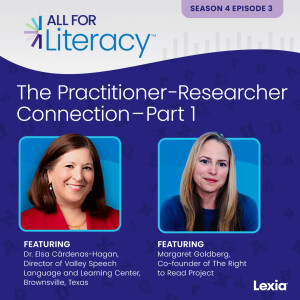
Tuesday Mar 04, 2025
Tuesday Mar 04, 2025
As the crucially important ideas of the science of reading spread, a shift of focus to sustainable implementation will ensure evidence-backed instruction continues to change the literacy landscape. Implementation relies on the mutually beneficial relationship between educators and researchers to work effectively and sustainably.
In Season 4, Episode 3, of the All For Literacy podcast, host Dr Liz Brook shares part 1 of her sit down with Margaret Goldberg and Dr. Elsa Cárdenas-Hagan for an insightful conversation about research access for educators. Goldberg, a literacy coach and co-founder of The Right to Read Project, brings an educator’s viewpoint, while Cardenas-Hagan pulls back the curtain on the world of research.
Together, this episode’s guests explore:
Effective partnerships between schools and researchers
Best practices for research dissemination
Evidence-based practices for emergent bilinguals
Integrating repetition and feedback into day-to-day classroom activities
Browse all resources mentioned in the episode in the show notes.
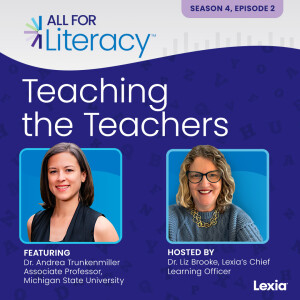
Tuesday Feb 11, 2025
Tuesday Feb 11, 2025
In Season 4, Episode 2, Dr. Truckenmiller joins All For Literacy host Dr. Liz Brooke for an in-depth conversation about implementing research-backed literacy practices sustainably in real-world classroom settings.
Dr. Truckenmiller currently collaborates with school districts to improve decision-making based on writing and reading assessment within the Multi-Tiered Systems of Support framework, ensuring all students receive equitable access to evidence-based instruction, according to their strengths and needs. She shares her expertise in applying the science of reading with listeners, including actionable information about:
Appropriately using assessment to select appropriate and specific interventions
Reframing assessments to better serve all students
Using subskill analysis to better approach instructional targets
Cohesively connecting reading and writing instruction
For links to resources referenced in the episode, explore the show notes.
About Adrea Truckenmiller
Dr. Adrea Truckenmiller serves as an associate professor at Michigan State University, where she conducts research in the special education and school psychology programs. She is also the co-developer of the Multi-Tiered Systems of Support (MTSS) master’s degree program and currently collaborates with school districts to improve decision-making based on writing and reading assessment within the MTSS framework.
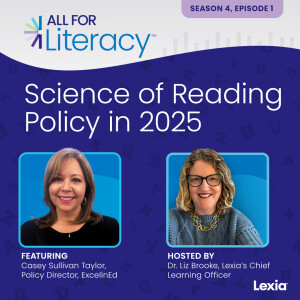
Tuesday Jan 07, 2025
Tuesday Jan 07, 2025
The best intervention is prevention, explains Casey Sullivan Taylor, policy director for early literacy for ExcelinEd. This education resource aims to ensure the success of every student through student-centered, state-based policy solutions.
The former reading teacher, interventionist, and literacy coach joins All For Literacy host Dr. Liz Brooke for an in-depth exploration into how literacy policy trickles down into district changes, professional development programs, and classroom activities with one ultimate goal—driving student success.
Gain an open-door look into how leaders in states like Mississippi and North Carolina have used policy and implementation to turn around literacy rates and support student learning at all levels and understand the keys to success for creating change through state-directed guidance.
Episode Breakdown
(00:52) - How Sullivan Taylor became involved in education
(04:29) - The Mississippi Marathon: Driving literacy change in Mississippi
(07:38) - Applying Mississippi Lessons in North Carolina
(10:20) - How state size and population affect policy implementation
(13:40) - Empowering districts with top-down policy
(17:12) - Resources for assessing policy status
(18:56) - Resources for educators and parents to encourage literacy success
(24:45) - Assessing teacher application of knowledge
(27:20) - Trends in literacy policy and literacy in general
(30:15) - Origins of the spotlight on literacy in this country
(33:20) - The criticality of policy
(39:50) - What makes Sullivan Taylor hopeful for the future of literacy
Explore mentioned resources on All For Literacy today!
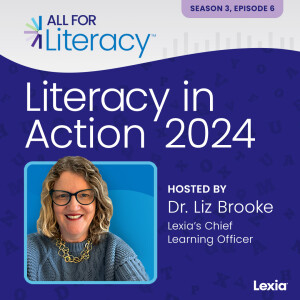
Tuesday Dec 10, 2024
Tuesday Dec 10, 2024
In this podcast episode, host Dr. Liz Brooke journeys through season three of All For Literacy, recapping insight and common threads as discussed with key industry voices.
Brooke shares highlights from discussions with Dr. Julie Washington, Dr Linnea Ehri, Dr. Katie Pace Miles, advocate Debbie Meyer, and other valued guests while providing insight on the trending literacy themes of 2024.
This episode covers the shift from reading wars to reading revolution, the education of displaced students, the foundations of othrographic mapping, the intersection of community and literacy and more!
Explore show notes, all the mentioned resources and episode time stamps on the All For Literacy website.

Tuesday Nov 19, 2024
Tuesday Nov 19, 2024
“When we were growing up, having good grades wasn't cool. What we're trying to do is make it cool today,” says David Wyatt about his commitment to driving educational change through his work with the South Carolina Football Hall of Fame and the South Carolina Top 10 by 2030 initiative.
A seasoned attorney, advisor, and community leader in South Carolina, Wyatt joins All For Literacy host Dr. Liz Brooke for Season 3, Episode 5, which was recorded live during The Reading League 2024 Conference. Wyatt and Brooke discuss empowering youth, making learning cool, and how educators can partner with community organizations to make change happen in their classrooms and districts.
Wyatt shares how he’s used the powerful influence of sports in his community to increase educational excellence and career readiness among students in his home state:
Find and partner with community organizations to support student success
Bring in influential mentors to inspire students to love learning
Cut through the noise and motivate students to commit to their education
Explore the resources mentioned in this episode in the show notes!

Tuesday Oct 22, 2024
Tuesday Oct 22, 2024
What steps should concerned parents take if they suspect their child is facing literacy struggles?
Meyer shares the strategies she has learned during her own advocacy journey, including:
The top five questions parents should ask at school
The surprising reasons students struggle to read
Outside-of-the-box solutions to improve literacy skills
How to be an effective advocate
Listen to Season 3, Episode 4, of All For Literacy and become empowered to create the change students and educators need to improve literacy rates, and subscribe to the podcast to never miss an episode.
See the episode breakdown & all mentioned links at All For Literacy today!
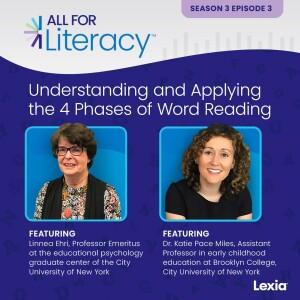
Tuesday Oct 01, 2024
Tuesday Oct 01, 2024
What is Alphabetic Phase Theory, and how can it help students develop their literacy skills?
Tune into Season 3, Episode 3 of All For Literacy for the answer as host Dr. Liz Brooke is joined by literacy research powerhouses Dr. Linnea Ehri and Dr. Katie Pace Miles. A distinguished professor emeritus at City University of New York, Dr. Ehri focused her research on the reading acquisition process. Dr. Miles, who earned her doctorate while studying with Dr. Ehri as a teacher, shares her expertise in continuing the implementation and application of Alphabetic Phase Theory.
Drs. Ehri and Miles share which foundational skills are most critical when learning to read, helping educators focus their classroom activities to support literacy studies. The pair also covers the research behind these skills in an easy-to-digest way, what questions to ask during an assessment to understand a student’s alphabetic knowledge, and the appropriate subsequent interventions.
Get an inside look into orthographic mapping—what it is and how to translate the research into practical classroom activities; evidence-backed interventions; and actionable advice to use the science of reading to enrich the lives of their students.
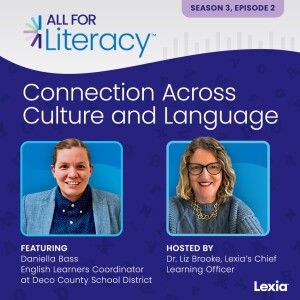
Tuesday Sep 03, 2024
Tuesday Sep 03, 2024
An English learners coordinator at DeKalb County School District in Georgia, Bass joined All For Literacy host Dr. Liz Brooke for Season 3, Episode 2. After working with refugees through various nonprofits and AmeriCorps, Bass earned her Masters of Arts in Teaching and has dedicated her career to supporting this population as they learn English.
Gain actionable insight into how to:
Build a sense of connection across a range of diverse backgrounds, and why this connection supports student success
Use content knowledge and background knowledge to increase student learning
Include content-area teachers in literacy programs
Honor students’ first languages and leverage what they already know
Engage specifically with the parent population
Identify useful resources
Listen to Season 3, Episode 2 today to gain a better understanding of how to approach language and literacy in multilingual and multicultural classrooms.
Join our community of listeners on All For Literacy today for exclusive resources!




